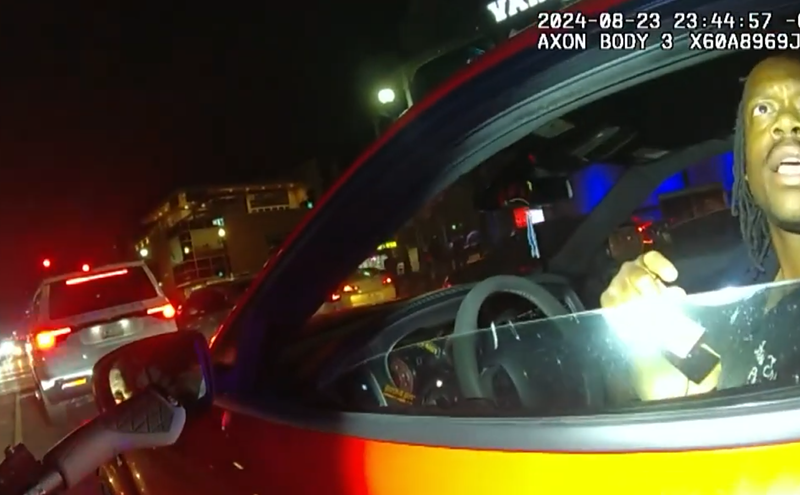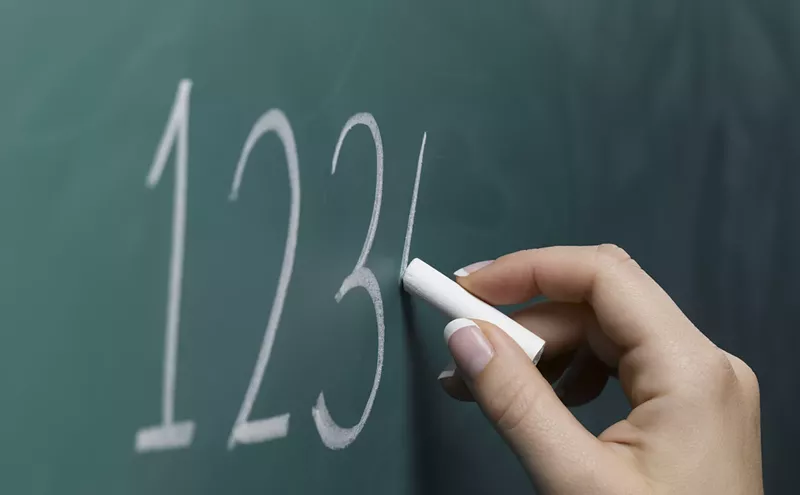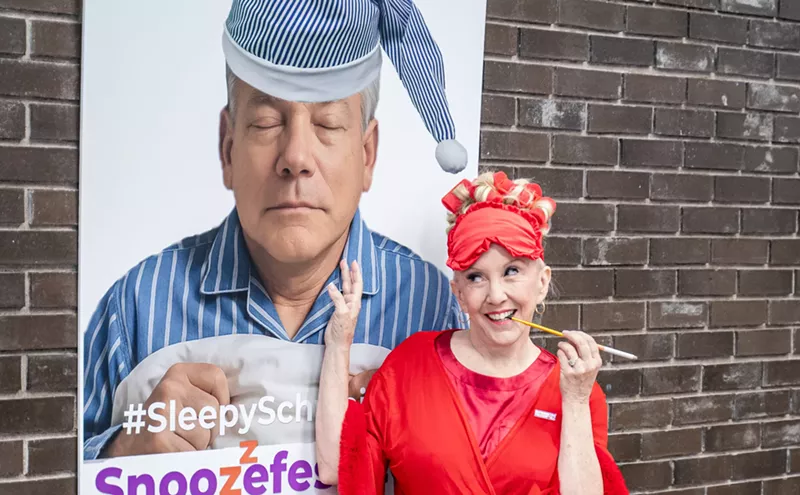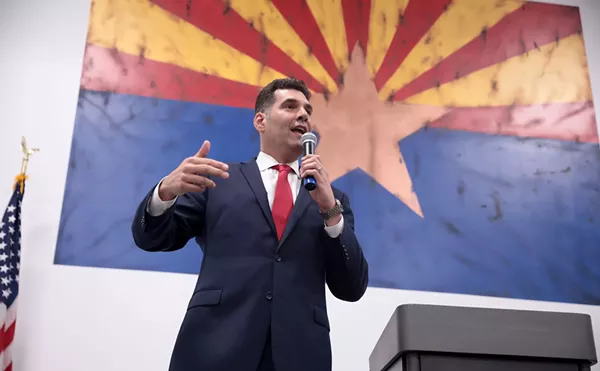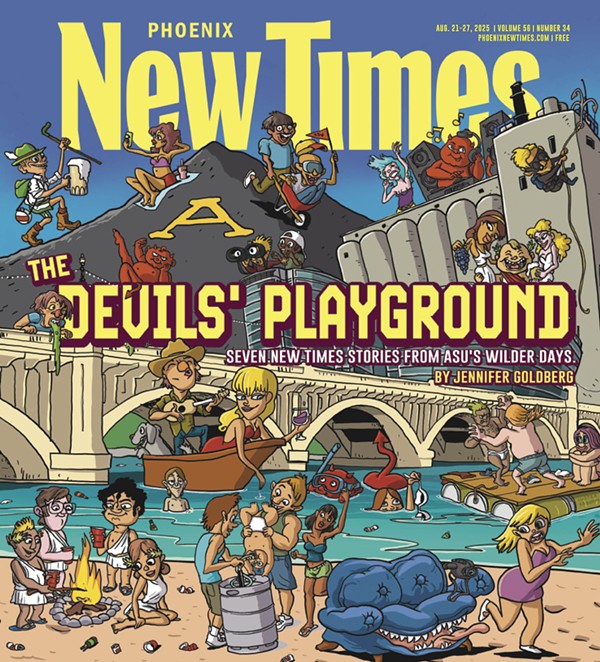The Republican politician's been on a crusade against cannabis freedom for several years now, appearing frequently at town hall presentations across Arizona to spread her propaganda. She's a cheater as well as a propagandist, using the public's money to attack a planned 2016 legalization initiative that's supported by about half of the public. However, her litany of cherry-picked statistics, straw man arguments, and outright lies probably goes over better in the conservative stronghold of her county, where people love their booze but don't know much about pot.
The late-afternoon event was well-attended, with about 150 people filling the seats in an auditorium at ASU's Walter Cronkite School of Journalism and Mass Communication. Judging by the timing of the applause — and some of the groans when Polk would utter another inanity — the crowd consisted mostly of legalization supporters.
Polk was joined on stage by J.P. Holyoak, a dispensary operator and chair of the main legalization campaign, and Will Humble, former director of the state's Department of Health Services and current health-policy director for the University of Arizona's Center for Population Science and Discovery in Phoenix. Her bad information was contradicted on occasion by both of her fellow panelists as well as moderator Dan Hunting of the Morrison Institute for Public Policy, which coordinated the event.
"I think a lot of people think that legalized marijuana just means your next-door neighbor using marijuana or perhaps growing their own marijuana plant," Polk said in her opening statements. "These initiatives are about the legalization for profit of an industry that will aggressively manufacture and sell an addictive product, just like the alcohol industry... Would you really be comfortable watching a football game with your son, when a commercial comes on and show beautiful people using marijuana and having a great time?"
The argument, as Polk's using it, is a ruse.
While a non-regulated plan would be freer than what's proposed, it would also expand the black market for marijuana. The only palatable legalization scheme for voters is one regulated — like so many other things in our lives — by the government. The nationwide movement is also about freedom — for the tens of millions of Americans who enjoy marijuana occasionally and would like not to deal with the black market or police as a consequence of their use. But Polk's style of conservatism, like Maricopa County Attorney Bill Montgomery's, defies the American tradition of individual freedom when it comes to marijuana.
To take voters' eyes off the freedom argument, Polk wants to define the legalization movement as one primarily of corporate greed and Mad Men. This is like saying alcohol Prohibition ended because of the greed of Anheuser-Busch and Four Peaks Brewing Company.
Polk's tactic is to create not just straw-man arguments (which are rhetorical devices in which an imagined position by an opposition group is torn apart), but a whole straw-man world. It's entirely unclear whether the fictional TV commercial she describes would ever be aired. After all, the Public Health Cigarette Smoking Act of 1970 banned cigarette ads from TV and radio, so maybe federal-scale cannabis legalization would include such a limitation.
And of course, Polk didn't mention that Colorado's rules for retail marijuana sellers already ban the shops from most forms of general advertising, including the type of TV commercial Polk warned of.
Ultimately, "the Colorado experiment is a disaster," Polk claimed.
Yet the very first factoid she threw out to support that argument is false. She said that a recent poll in Colorado showed that if that state's adult-use measure was on the ballot today, "it would not pass."
Sitting in the audience, we conducted a quick Google search on our phone for "Colorado retail marijuana poll." We found that not only do Colorado voters still support their decision to make marijuana legal for all adults 21 and older, but that support for the legalization law has increased from 58 percent in February to 62 percent in April."These initiatives are about the legalization for profit of an industry that will aggressively manufacture and sell an addictive product, just like the alcohol industry." — Sheila Polk
tweet this
The politician's facts and figures simply aren't reliable.
In another instance, she maintained that it's "ridiculous" to say that alcohol is more dangerous than marijuana. Scientists have long studied that question, and they don't think it's ridiculous. A major study published in January compared 10 different commonly used substances and concluded that marijuana was by far the least risky.
When Polk blurted out that medical research on marijuana isn't stymied because of the plant's Schedule One status under the law, (Schedule One being defined as a total lack of medicinal benefit), even moderator Dan Hunting couldn't help but push back. He laughed openly at Polk's assertion and said she had to admit the research has been hampered by marijuana's federal status. Humble then weighed in, stating that if the feds had been "objective," marijuana would already be at Schedule Two or Three.
Humble also felt compelled to slap down Polk's theory that marijuana prohibition made life better for families by deterring kids from using it. Income is the number one indicator of a family's overall health, he said, and a family member's felony conviction would have a "big impact on income."
Her response was that most people arrested for marijuana possession aren't convicted of felonies, which is true. Yet as Holyoak pointed out, having a misdemeanor on one's record can also hamper efforts to find a job. He said that, as a businessman, he'd skip over a job application if the person revealed a misdemeanor conviction — an answer Polk liked.
Holyoak more than made up for his minor misstep, though, when he backed Polk into a corner on her weak knowledge of medical marijuana. She said that certain compounds could be effectively extracted from cannabis plants to make medicines for kids who have seizures, but that the entire plant can't be considered medicine. The ever-serious Holyoak took the opportunity to mention that he knows more about that subject than anyone else in the room. His daughter suffers from seizures and has experienced relief from medicine extracted from the whole plant, he said.
In another of Polk's straw-man arguments, Polk claimed repeatedly that legalization advocates believe that marijuana legalization would eliminate the drug cartels.
"They want you to go vote to legalize marijuana to get rid of, supposedly get rid of, drug cartels in another country," she said, repeating later that advocates believe legalization would make cartels "just go away."
Few people, if anyone, actually believe that. The point made by legalization advocates is that it would hurt the drug cartels' business, reduce their power, and eventually eliminate their influence in the marijuana industry, as was done with alcohol.
With no political will in Arizona or anywhere else to legalize meth, heroin and cocaine, the cartels will no doubt still find customers. But statistics show that use of hard drugs by Americans has never been widespread and has been in decline for years.
Like Pinal County Attorney Lando Voyles, another fact-challenged prosecutor who rails against marijuana, Polk doesn't understand that a huge motivation for legalization is that Americans — both marijuana users and non-users — would rather that people purchase marijuana through legal channels. The continued existence of cartels after legalization is somewhat irrelevant.
On the subject of marijuana's alleged danger to users, Polk said it frustrates her that people keep saying marijuana has never killed anyone while some high-profile cases of people harming themselves or others make the news. She referred to the cases of Richard Kirk, who claims marijuana made him kill his wife, and suicides that were potentially marijuana-related.
We won't get into the many issues surrounding those cases. But we'll point out that such cases appear to be extremely rare.
As we've covered extensively, marijuana-impaired drivers who maim or kill people in Arizona are also rare. Marijuana can impair driving and does sometimes lead to fatal vehicle crashes, but those are the exceptions that prove the rule.
After the event, we asked Polk if she could refer us to a single case her office has prosecuted in which a driver believed to be impaired only by marijuana killed or seriously injured someone. Polk gave us a cold stare. She grew visibly perturbed as we repeated our question, then stalked off without answering it.
Legalizing marijuana in Arizona would certainly have consequences, and it's great that the Morrison Institute is organizing these type of policy round-tables for the public.
But only if the public receives quality information.
Got a tip? Email Ray Stern
Follow Ray Stern on Twitter: @RayStern
Follow Valley Fever on Twitter: @ValleyFeverPHX



